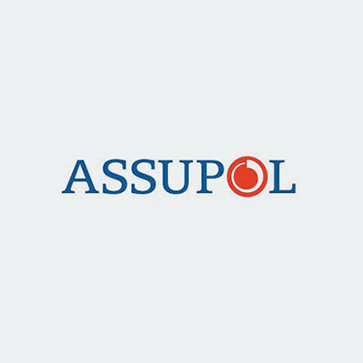A Good Story of More than 100 Years
Assupol

Assupol was founded over a century ago in 1913 when a group of South African policemen began collecting contributions to assist the bereaved families of colleagues that had passed away. This initiative led to the establishment of the South African Police Provident Fund which later became known as Assupol.
Assupol registered as a life insurer in 1960. Fast-forward some three decades: in the 1990s the company spread its wings into the open market to become a full-fledged life insurer. Though Assupol’s core market remains the government sector, the company also made significant inroads into the private sector, including the middle-income demographic.
Over the years, Assupol’s business underwent several changes, adapting to the market and its opportunities. In 2010, a milestone was reached with the demutualisation which transformed Assupol into a public company – Assupol Life Ltd. This process also led to the formation of Assupol Holdings Ltd and Assupol Investment Holdings (Pty) Ltd.
Assupol’s demutualisation resulted in the largest wealth distribution yet by an unlisted company in South Africa. Approximately 400 million shares in Assupol Holdings Ltd were allocated to qualifying policyholders – fully ninety percent of them from previously disadvantaged communities – and staff. In 2013, nearly R900 million was paid out to those who elected not to keep their shares.
Hugh Masekela, South Africa’s world-renowned music legend, is the Assupol brand ambassador. The company has partnered with Mr Masekela in staging his successful annual heritage musical festival. Like Assupol, Mr Masekela is passionate about the people of South Africa and their proud heritage. The 2013 and 2014, Hugh Masekela Heritage Festivals were a huge success.
In 2014, the Deloitte Best Company to Work for Survey ranked Assupol sixth in a field of twenty-one medium-sized companies. The survey is conducted annually and aims to identify and celebrate the best companies to work for across the Southern African region, as rated by their employees.
Assupol undoubtedly is on the move, with great aspiration.
Assupol Stats
| Assupol Holdings shareholder | Share |
|---|---|
| Investec | 30% |
| International Finance Corporation | 20% |
| Women Development Business | 11% |
| Assupol Community Trust | 7% |
| Management and staff | 21% |
| Free float | 11% |
| Partners | Service Provider |
|---|---|
| External auditors | Price Waterhouse Coopers |
| Internal auditors | KPMG |
| Statutory actuary | Deloitte (Carl van der Riet) |
| Reinsurers | Hannover-re and Munich-re |
| Asset managers | Pan African Asset Management |
Assupol Mission & Business
Assupol Mission, Vision, and Values
- Mission: to serve those who serve
- Vision: to be the insurer of the people
- Values: to treat our customers fairly
Assupol’s Core Business
- Providing life insurance products on an individual and group basis
- Products:
- Funeral cover – up to R50,000 for individuals, and R30,000 for groups
- Life cover – no blood tests up to R300,000, and blood tests over R300,000
- Retirement annuity – from R180 per month
- Savings – from R100 per month
- Group funeral and accident cover
Assupol Setting Trends
- Assupol was the first life insurer to commit to paying benefit claims within 48 hours. In the 2014 financial year, the company succeeded in paying 95% of claims within 24 hours, and 98% within 48 hours.
- Assupol was the first to introduce a “cash-back” product. The company’s products pays back all premiums after ten claim-free years.
- Assupol introduced InstantGroceries (a registered trademark) – a first-in-the-market product that provides money for groceries and other necessaries via cell phones within minutes after a valid death claim has been recorded with us.
- Assupol began using Persal (the government’s salary payment system) as payment method for policies.
- Assupol began to pay benefits via the Post Office.
Assupol Future
- Market diversification
- Distribution diversification
- Product diversification
- Other strategic alliances
- Efficiencies drive
Assupol CEO Rudi F Schmidt
Be Fast and Keep It Simple
A strong believer in pursuing organic growth, rather than seeking expansion via acquisitions, Assupol Group CEO Rudi F Schmidt leads a life insurance company that is widely praised for being conservatively managed, well capitalised, and with a strong focus on its core business – serving the lower and middle income market segments with sensible, no-frills products delivered clearly, locally, efficiently, and quickly.
If simplicity is the key to enduring success, the Assupol CEO and his management team have nailed the formula to perfection. “In the demographic that Assupol serves there is absolutely no room for mistakes: we must get it right each and every time,” says Mr Schmidt who goes on to emphasise that whatever product his company launches on the market must dovetail perfectly with demand and resonate with clients down to the individual level. “Our customers expect products that address specific needs and do so in a clear and well-defined manner. Most Assupol clients are quite suspicious of insurance products that promise the moon but may then fail to deliver in a straightforward and timely manner.”
Market Understanding
Assupol Life Director Bridget Mokwena-Halala explains: “We thoroughly understand our market and our customers by continuously interacting with both and fine-tuning our suite of products to offer the best fit. Assupol operates in a market segment that has traditionally been overlooked by others. Our products are really easy to understand and come devoid of layers of complexity. They are delivered via a network of inviting offices: rather than glamorous and expensive-looking, Assupol branches are highly visible and invite customers and potential clients in with a no-nonsense setting and decor. We are not here to fête customers, but serve them in an efficient, down-to-earth way that gets the job done with a minimum of fuss.”
While nowhere in Africa insurance penetration is deeper than in South Africa, the lower end of the market has traditionally been underserved. “Financial literacy is still quite limited in the lower income brackets. Also, cultural preferences are quite distinct and must be taken into consideration, and catered to, in order to properly serve our clients,” says Mr Schmidt.
Assupol’s flagship product is a funeral cover that allows policy holders the peace of mind that stems from the knowledge that all burial costs and related expenses are promptly paid for when a loved-one passes away, thus avoiding any additional stress in times of bereavement.
“Assupol has its roots in a burial society for policemen. However, burial societies can no longer survive in the modern era due to the incidence of HIV. Insurance companies such as Assupol have stepped in to fill the void and provide the support needed. However, Assupol stands out from the crowd because of its cultural awareness. We fully realise that most policy holders will not have the cash reserves to meet even modest initial expenses. It is with his in mind that we developed a system which allows us to make a first payment within mere hours of a death having been reported. Fully 95% of claims are settled within 24 hours.”
Mr Schmidt explains that his company has put great effort in developing payment systems that bypass traditional banks: “Quite a few of our policyholders may not have bank accounts. South African banks impose strict requirements on accountholders that not everyone can meet. In response, Assupol has developed a number of systems that allow monies to be paid out via mobile banking networks and other non-traditional means. We make sure that all our clients can have access to claims monies in record time, irrespective of their banking status.”
Monitoring Feedback
Mrs Mokwena-Halala points out that Assupol is careful to monitor the feedback it receives from clients and leverages that input to enhance its offerings and build trust: “Our company is mostly in the business of listening – to individual clients and the broader market alike. This not only enables Assupol to stay a few steps ahead of the competition but allows us to avoid making mistakes.”
Mrs Mokwena-Halala notes that in the wake of the financial crisis, most insurance companies opted to downsize their branch network and pick up the resulting slack via call centres. “Because we actually understand our clients’ concerns and needs, Assupol kept its branch network intact. In our market segment, people often dislike conducting business over the phone in a rather impersonal way. They prefer to interact with other people who can promptly answer questions in person, allay fears, and address concerns. Visibility is a definite plus and we make sure that our offices are highly visible and easily accessible. Our approach was the right one and you can already now see other insurers reopening branches in an attempt to undo the damage.”
Assupol also maintains a network of mobile offices that bring the insurer to the far corners of the country. “These office may be quite expensive to operate, but we are reaping the benefits of this investment. The closer physical proximity we maintain to our customers, the better we are able to do our job,” says Mrs Mokwena-Halala.
Assupol CEO Rudi Schmidt emphasises that the company remains true to its roots: “We are first and foremost an insurer to the people. While the company has long since expanded its core market to beyond that of civil servants, Assupol attaches great importance to its heritage as an insurance company with a range of products tailored to serve the interests of people of more modest means. That is also our brief as we face the future. Assupol may move upmarket but will only do so while adhering to its mission which is to take complexity out of insurance products by offering coverage for specific events in a fully transparent manner and in a way that allows us to move fast in case a claim comes in. No frills, no nonsense, and no small print. It sounds simple, and in reality is. However, in South Arica only Assupol has managed to develop this formula into one delivering benefits to all stakeholders.”


